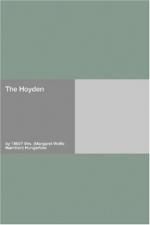Her laughter rings through the room. The hot sun behind her is lighting the splendid masses of her red hair, and the disdainful gleam that dwells in her handsome eyes.
“Of course not,” says Lady Rylton, a little stiffly; “even to mention such a thing seems to be—er—a little——”
“Only a little?” says Mrs. Bethune, arching her brows. “Oh, Tessie!” She pauses, and then with an eloquent gesture goes on again. “After all, why shouldn’t I be immoral?” says she. Once again she flings her arms above her head so that her fingers grow clasped behind it. “It pays! It certainly pays. It is only the goody-goodies who go to the wall.”
“My dear Marian!” says Lady Rylton, with a delicate pretence at horror; she puts up her hands, but after a second or so bursts out laughing. “I always say you are the one creature who amuses me,” cries she, leaning back, and giving full play to her mirth. “I never get at you, somehow. I am never quite sure whether you are very good or very—well, very much the other thing. That is your charm.”
The stupid, pretty little woman has reached a truth in spite of herself—that is Mrs. Bethune’s charm.
A quick change passes over the latter’s face. There is extreme hatred in it. It is gone, however, as soon as born, and remains for ever a secret to her companion.
“Does that amuse you?” says she airily. “I dare say a perpetual riddle is interesting. One can never guess it.”
“As for that, I can read you easily enough,” says Lady Rylton, with a superior air. “You are original, but—yes—I can read you.” She could as easily have read a page of Sanscrit. “It is your originality I like. I have never, in spite of many things, been in the least sorry that I gave you a home on the death of your—er—rather disreputable husband.”
Mrs. Bethune looks sweetly at her.
“And such a home!” says she.
“Not a word, not a word,” entreats Lady Rylton graciously. “But to return to Maurice. I shall expect you to help me in this matter, Marian.”
“Naturally.”
“I have quite understood your relations with Maurice during the past year. One, as a matter of course,” with a shrug of her dainty shoulders, “lets the nearest man make love to one—— But Maurice must marry for money, and so must you.”
“You are all wisdom,” says Marian, showing her lovely teeth. “And this girl? She has been here a week now, but as yet you have told me nothing about her.”
“I picked her up!” says Lady Rylton. She lays down her fan—looks round her in a little mysterious fashion, as though to make doubly sure of the apparent fact that there is no one in the room but her niece and herself. “It was the most providential thing,” she says; “I was staying at the Warburtons’ last month, and one day when driving their abominable ponies along the road, suddenly the little beasts took fright and bolted. You know the Warburtons, don’t you? They haven’t an ounce of manners between them—themselves, or their ponies, or anything else belonging to them. Well! They tore along as if possessed——”




